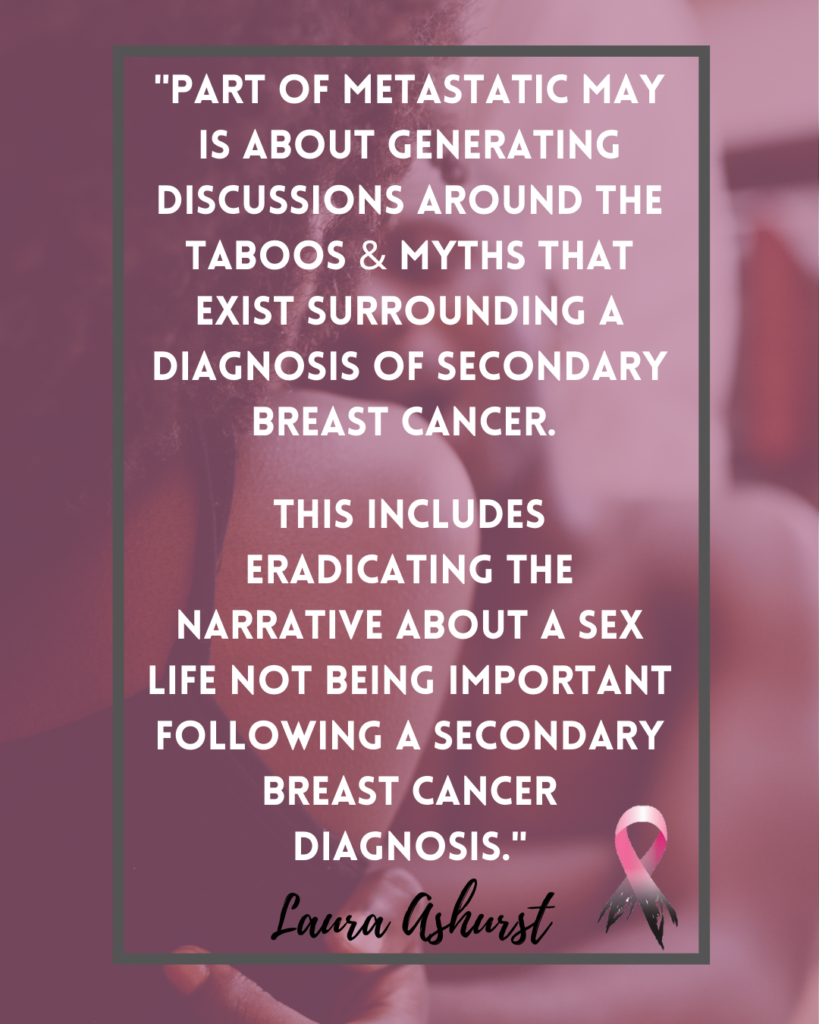
A diagnosis of cancer is a major life event. None of us is immune to the
potential of developing the disease. It doesn’t discriminate by age, gender,
sexual orientation or ethnicity. It can also develop in any part of the body. In
the case of breast cancer, one in seven women will be diagnosed with it
during their lifetime. Approximately 30% of those women will go on to develop secondary breast cancer.
Shock, fear, grief and uncertainty about the future are just some of the
feelings and emotions that can arrive at our door after hearing the words ‘you have breast cancer’. Being diagnosed with it impacts so many aspects of a person’s life; its ripple effect sends waves throughout all parts of our existence including striking at the very core of a woman’s femininity.
Breast cancer directly affects the part of the female body that is associated
with our sexuality and sexual and reproductive functioning. For those reasons, emotional attachment to breasts is woven deeply within many women but perhaps our attachment to our breasts isn’t something that many of us give much thought to prior to a breast cancer diagnosis; prior to being told, that in the case of a lumpectomy, part of our breast needs to be surgically removed and in the case of a single or double mastectomy, our whole breast or breasts.
The distressing psychological, emotional and physical impact of breast cancer surgery is accompanied by debilitating side effects of breast cancer drug therapies that are researched and developed to reduce the risk of recurrence, or in the case of secondary breast cancer, designed to control the metastatic spread of disease for as long as possible.
Breast cancer treatment side effects are wide-ranging. A significant effect is
the toll that treatment takes upon sexual intimacy and the ability to enjoy an
active sex life post-breast cancer diagnosis. And whilst some side effects of
breast cancer treatments are commonly discussed such as the trauma
associated with hair loss and the impact this has upon an individual, the effect of treatment on our sex life is less so.
Around 70% of breast cancers are oestrogen receptor-positive meaning that a woman can be exposed to endocrine therapies such as Tamoxifen and/or
Aromatase Inhibitor (AI) drugs help to reduce the recurrence of the breast
cancer. AI’s can also be given to women who have oestrogen positive
secondary breast cancer in an attempt to control the spread of the disease.
They are drugs that are designed to manipulate oestrogen expression,
reducing and blocking its secretion into the bodily tissue but by their very
nature, they also possess a wide range of side effects when we are exposed
to them, including vaginal dryness and irritation, vaginal atrophy, fatigue, loss of libido, and the onset of menopausal symptoms These side effects all have a direct impact upon a woman’s ability to experience sex and intimacy in the same way prior to diagnosis. Add to this is the huge effect on our body image and self-esteem of having had part or the whole of one or both breasts removed and it’s little wonder that so many of us experience emotional trauma and distress.
Surgical and drug-induced menopause presents huge challenges for
thousands of women undergoing treatment for breast cancer. It’s essential
that the team of health professionals responsible for our care provide
appropriate guidance, advice and support to help us manage such acutely
personal effects of treatment. It’s not acceptable that side effects such as
vaginal atrophy, dryness and irritation leading to difficulties and pain during
intercourse remains the elephant in the room when these drugs are prescribed.
The way in which endocrine drug therapies and other breast cancer drug
therapies affect a woman’s ability to have pain free sexual intercourse should receive as much emphasis and attention as is given to the fatigue they cause and side effects such as bone thinning and the risk of osteoporosis.
A breast cancer diagnosis is multi-faceted whether it’s a primary or a
secondary diagnosis. Each one has far-reaching effects on all aspects of our lives. A large part of finding our way around our new ‘normal’ is support,
whether we are in a sexual relationship or not, around how well we are able to thrive when it comes to our sex life.

Part of Metastatic May is about generating discussions around the taboos and myths that exist surrounding a diagnosis of secondary breast cancer. This includes eradicating the narrative about a sex life not being important
following a secondary breast cancer diagnosis. It goes without saying that we are grateful for every day that we have but it needs to be said that our ability to regain our confidence and enjoy a sex life, is an area with which we need help and support to realise. Sex and intimacy plays an important role in
holistic wellbeing. Is it too much to ask that we should be given support to
resume or maintain sexual activity? We need to understand the full effect
upon us of our treatment regimes, including how they will impact us in this part of our lives. A supportive, open and empathetic clinical environment and relationship with our care team where all aspects of our exposure to our
cancer drugs are fully explained are needed for this to happen. This should be the norm and not the exception.
This is a call to the health professionals who treat us: at the point of diagnosis, please enable us to fully understand the side effects of our drug treatment regimes which includes their impact on the functioning of the vaginal tract, so that we can become empowered with knowledge and understanding, including signposts for help and support. It is a duty of care that you outline just how significantly all aspects of our lives will be affected by the drugs we are given to control this disease. You are perfectly positioned to initiate sensitive yet much-needed conversations about the impact of exposure to endocrine breast cancer drugs such as the hugely debilitating side effects of vaginal atrophy, dryness and irritation.
I’m twenty years into my history of breast cancer. I have floundered around in the dark from the age of 34 with no help in this area at all. We need health
professionals to look at us as a whole person. Sexual intimacy can be
daunting, to say the least after diagnosis. We need your help to make it less
so.
The most difficult conversations are always are the most important ones to
have but with empathy and support, we can be helped to navigate through our diagnosis and for that we will be grateful too.

By MetUpUK Member, Laura Ashurst
